| We the People Membership Summit ... next
> |
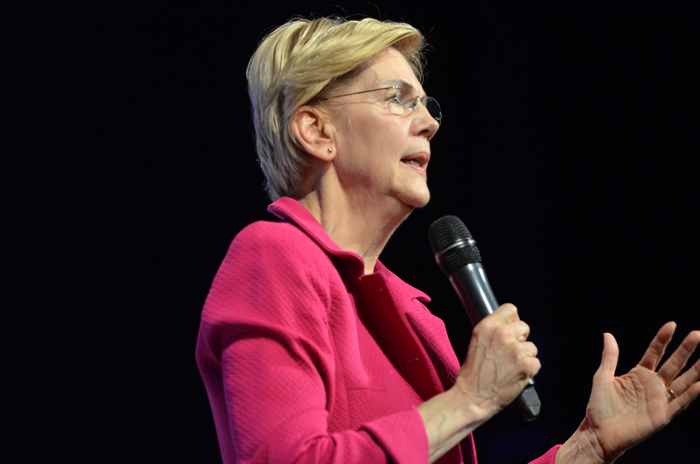 |
| April 1, 2019 - "When a government works great for those at the top and for no one else that is corruption pure and simple and we have to call it out," declared U.S. Sen. Elizabeth Warren. Warren went longer than the alloted time in her introductory remarks and finished speaking to the accompaniment of Aretha Franklin's "Respect" as organizers tried to get her to wrap up. It may have helped as she received the most enthusiastic response of any of the speakers. |
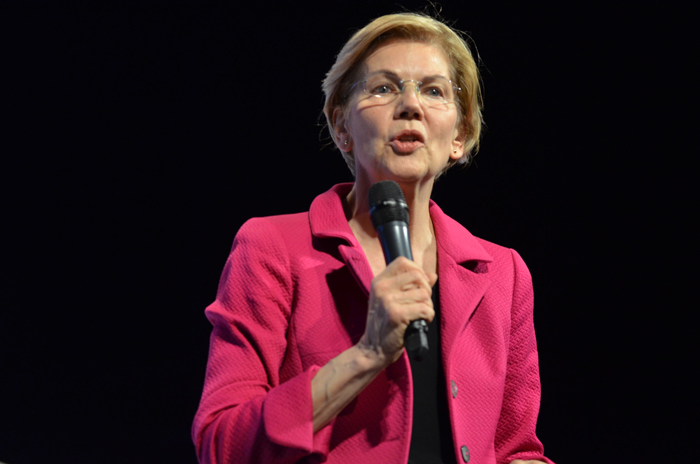 |
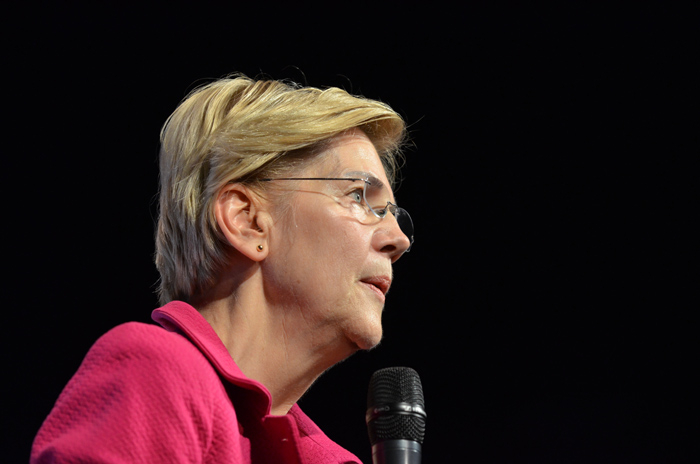 |
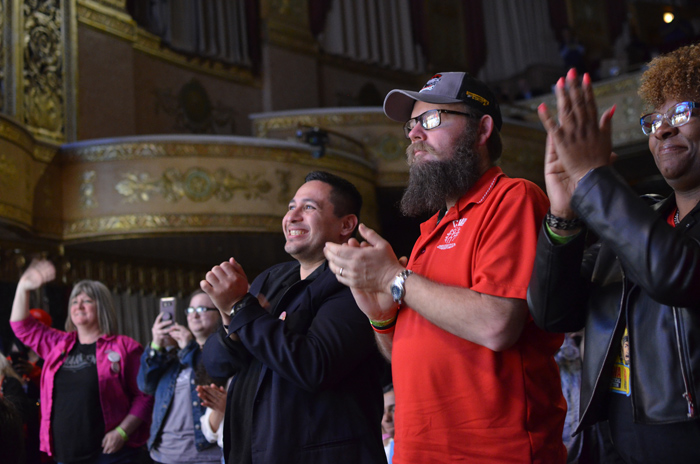 |
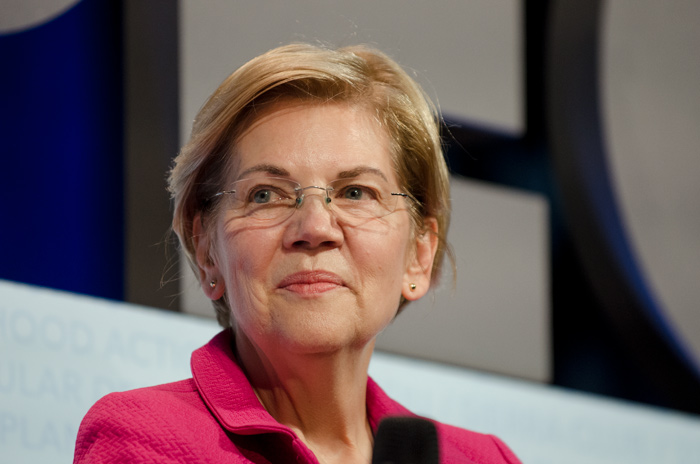 |
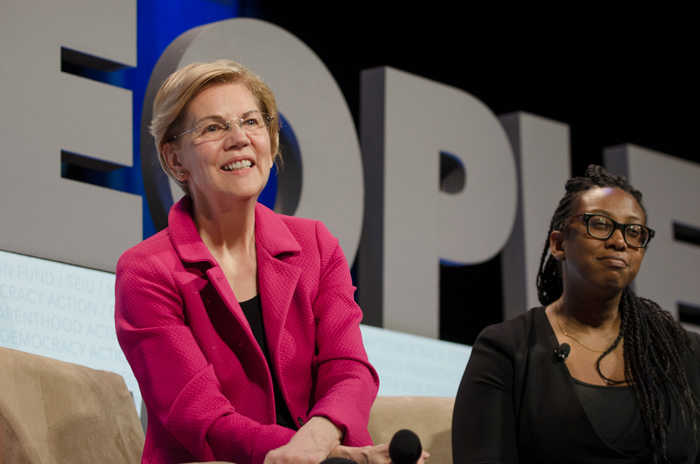 |
|
Elizabeth
Warren—Transcript
of
Opening
Remarks
Hello. Wow. What a great crowd. I am so glad to be here with you all today. You know, this is a perilous time for our country. And every single day that goes by we see a new form of the risks posed by our country by a corrupt administration. We woke up this morning to find out that at least 25 people in this administration had been denied security clearances. Yeah. Why? Oh, because they had ties to foreign governments, because they had conflicts of interest, because they had financial problems that made them vulnerable. And what does the President of the United States do? Instead of saying, hey, whoa, my responsibility is to watch out for the American people, no, these are friends, these are people with money and with connections. And the answer was just ram 'em on through. The Trump administration is a walking, talking, living, breathing threat to national security. And we just have to call it out. And that's what I want to talk about today. I want to talk about corruption. I want to talk about this cancer on our country, corruption and opportunity. Look, I see it this way. Yeah, I was born out in Oklahoma in a family that didn't have much. We were very much paycheck to paycheck. My— I have three older brothers. I'm a late in life baby, often referred to as the surprise. And by the time I was in middle school the boys, as they are called to this day, the boys were all off; they had joined military and they were all off. There was just my momma and my daddy and me. And my daddy had a heart attack, a really serious heart attack. And we thought he was gonna die. He pulled through, but he couldn't go back to work. So long time goes by, we lose the family station wagon. At night, when I go to bed, I hear my parents talking. And that's when I learned words like mortgage and foreclosure. And one day I walk into my parents' bedroom. And on the bed is the dress. Some of you know the dress. It's the one that only comes out for weddings, funerals, and graduations. And my mother is in her slip and her stocking feet. And she's pacing. And she's saying, we will not lose this house; we will not lose this house; we will not lose house. She's crying. She's 50 years old. She's never worked outside the home and she is truly terrified. So she finally pulls it together, puts on that dress, puts on her high heels, blows her nose, and walks to the Sears, where she gets a minimum wage job. Now that minimum wage job saved our house, and it saved our family. And if you want to know who I am, there's the story. And here's the thing. For many years, I thought that was a story just about my mother. About how no matter how scared you are, you reach down, find what you need to find, you pull it up, and you do what has to be done to take care of the people you love. What I discovered years later is it's the story of millions of families across this country, people who've reached down, do what has to be done, pull it up, and take care of the people they love. And it was only years after that I understood it is also a story about government. Because when I was in middle school, a full-time minimum wage job would support a family of three. Today, a minimum wage job in America full time will not support a mama and a baby and keep them out of poverty. I am in this fight because I want a government that cares a whole lot less about corporate profits and a whole lot more about families like ours. Now, I made it on through school, I got to live my dream. I got to be a special needs teacher; that was my lifelong—. Let's hear it for America's teachers, come on. Now, I taught back in the day though, and at the end of my first year in teaching, I was visibly pregnant, which meant the principal gave you a handshake, wish you well and hired somebody else for the job. That's how I ended up going to law school. That's how I ended up becoming a law— I practiced law for like 45 minutes, and then made it straight back into teaching. I traded the little ones for much taller students, but always worked on one central question. What's happening to working families in this country? What's happening to opportunity in this country? Why is it that for millions of people, people who work hard every day, the road is becoming rockier and steeper, and for people of color even rockier and even steeper. What has gone wrong in this country? So I look at this, and here's what I discovered. It is not an accident. It's not something that just happened on its own. What's happened in America has been a series of deliberate decisions made in Washington. Understand it this way. This government right now in Washington works great for giant drug companies, just not for people who are trying to get a prescription filled. Yeah. It works great for giant oil companies that want to drill everywhere, just not for people who are worried about the impact of climate change that is bearing down on us. It works great for giant financial institutions that are determined to make profits wherever they can, just not for people forced into payday lending, who are trying to make it paycheck to paycheck. When a government works great for those at the top and for no one else that is corruption pure and simple and we have to call it out. And the impact of that corruption is felt everywhere. For a generation now, adjusted for inflation, incomes are basically flat in this country. But what has happened to expenses? The cost of housing up more than two thirds. The cost of a health insurance premium more than doubled. The cost of sending a kid to school more than tripled. The cost of childcare up five times. The squeeze on working families is real, and the squeeze on families of color is deliberate. Let me let me just make one pitch here. We've known for generations, one way that working families build wealth is they do it by buying homes. You know the advantage you get an asset, it appreciates over time you get it paid off. So it's no surprise to learn that starting back in the 1930s, the U.S. government started subsidizing the purchase of housing, for white people. For black people, for brown people they discriminated; it was called redlining. And the consequence was, by the 1960s, there was a huge gap in home ownership between African Americans and whites. So what happens? We have a civil rights movement. We say we're going to change all this. We put money into housing, and it gets a little bit better. And then what happens? Along come the big banks, and they figure out that they can focus on communities of color, take wealth out of those communities and just leave the devastation behind. And where was our government, our regulators? They were working great for the rich and the powerful, just not for anyone else. The consequence of that, today, the black-white homeownership gap is larger than it was when housing discrimination was legal in this country. Think about that. And assets. For every hundred dollars of assets that a white family owns, a black family own somewhere around $5. This is not an accident. This is one deliberate policy in Washington after another, and we have to call it out now. That's step one, is to call it out. Step two is to say, we are committed to make [MUSIC starts] real change. We're going to attack this corruption head on. I have the biggest anti-corruption bill since Watergate. Lots of parts to it. I'll just tell you a couple. End lobbying as we know it. Stop the revolving door between Wall Street and Washington. And how about one more? Anybody who wants to run for federal office, you've got to put your tax returns online. [MUSIC volume increases] Attack corruption head on. They're going play me off here, but I'm gonna say two more things. We got to rewrite the rules in this economy. And that means more power in the hands of workers, we need to make it easier to unionize and give those unions more power. And one more, we need to rewrite the rules to protect our democracy. I want to see a constitutional amendment to protect the right to vote and make sure every vote gets counted. We're in this fight together all the way. You bet. Questions Ana Victoria Cruz Alanoca is 16 years old and a junior at Benjamin Banneker Academic High School and youth leader with United We Dream here in DC: [for-profit immigration detention camps and prisons] "...As you work to reform our justice system, what will you do to stop dark and corporate money from influencing both the nomination process as well as sitting judges, so people can get a fair shot at justice?" Chuck Tyler is a decorated U.S. Army combat veteran and a veteran campaign professional from Charlottesville, Virginia and a proud member of MoveOn: "...We also know that it's been individual donations from Wall Street and Silicon Valley that have fueled some of your campaigns. Small donor, publicly financed systems work... My question for you, Senator, is if you're elected president can we count on you to create a small donor public financing system on a federal level for every federal election and if so why?" Belinda Freeman, who hails from California and is a student at Clark Atlanta University in the Atlanta University Center. She is the founder and president of the University’s chapter of Planned Parenthood Generation Action: "What are your specific plans to end this country's ongoing assault on people of color's access to the polls, and how will you ensure that everyone has full access to the ballot box? |
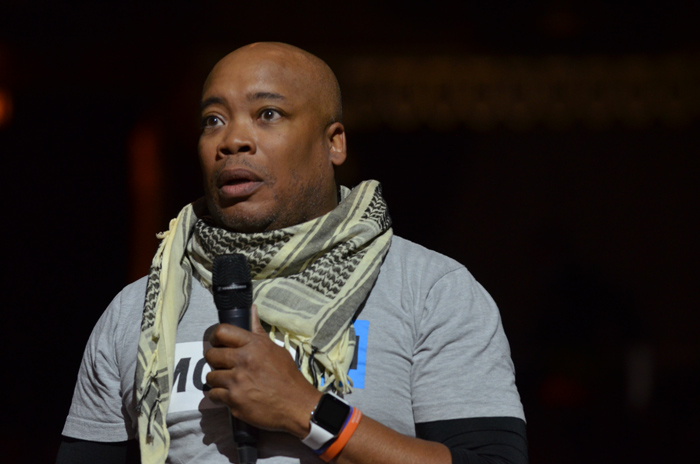 |
| Chuck Tyler. |
| next > |
| Main | General | Castro
| Booker
| Klobuchar
|
O'Rourke
| Warren
| Sanders
|
Inslee
|
Gillibrand |

